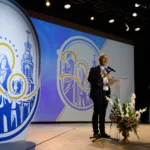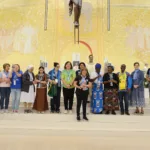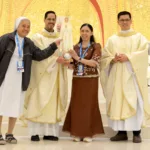…But with Meekness and Charity
The meekness of the lambs is perceived with the intensity of the contrast, staged immediately after its opposite represented by the ferocity of the animals that preceded them. When John somehow relives the same dream on the eve of the migration of the first oratory from the Ecclesiastical Boarding School to Valdocco, his reaction seems more ready and bold than when he was nine years old. We are on the second Sunday in October 1844: “I dreamt I saw myself in the midst of a multitude of wolves, of goats and kids, of lambs, sheep, rams, dogs and birds. All together they made a noise, a clamour, or rather a devilish noise that would frighten the bravest. I wanted to flee…” (Salesian Sources, 1241-1242).
The meekness and charity that we wish to achieve here must first and foremost be an inner ‘metamorphosis’ for John and for those who will become not only lambs, but shepherds of the flock, as foreshadowed in the dream of 1844 mentioned above. It is a ripe fruit that comes from a long gestation. It is an Easter fruit. It is a mutation that cannot be improvised and requires a long apprenticeship, as it was for the 12 apostles from the first meeting with the Master on the Lake of Galilee to the final ascent to Jerusalem, and from that new beginning to ‘the ends of the earth’ to which they were sent.
In the catechism, we used to learn to distinguish between cardinal virtues (prudence, justice, fortitude and temperance) and the theological virtues (faith, hope and charity). The latter are not the result of the ingenuity and volition of those who try their best. There is a combination of nature and grace, of grace and freedom, that allows this charity from above to become the energy that moves our steps and fills relationships with a vitality where ‘as it is in heaven’ and ‘as it is on earth’ are both at home.
There is an article in the Constitutions of the Salesians of Don Bosco dedicated entirely to the founder. Art 21: “The Lord has given us Don Bosco as our father and teacher. We study him and imitate him, admiring in him a splendid accord of nature and grace. Deeply human, rich in the virtues of his people, he was open to earthly realities; deeply man of God, filled with the gifts of the Holy Spirit, he lived ‘as if he saw the invisible’ (Heb 11:27). These two aspects merged into a strongly unified life project: the service of the young. This is the charity to which he was trained. By whom? By Providence to which he responded as best as he could, but which made use of many, first and foremost those wolves who became lambs: the young were Don Bosco’s first formators, by grace.
The meekness of the lambs in the dream, then, is not a bucolic image of tranquility, of a spring garden perfumed with flowers. If we look at the whole of Don Bosco’s life and mission, the realisation of that dream, it is rather a lamb and shepherd with a biblical flavour.
And in Scripture, the word that explains and illuminates all the others is always the concluding one, the one that comes from Easter. There, where the shepherd lays down his life for the sheep, we understand the scope of “Blessed are the meek, for they shall inherit the earth” (Mt 5:5): the cross is the fullness of this beatitude-prophecy. There is another reference to meekness in the same gospel, even more intense because the Master directly proposes himself as a model, precisely on this aspect: “Learn from me, who am meek and humble of heart” (Mt 11:29).
The word used in the Greek of the gospels and rendered in Italian as ‘meek’ is PRAUS – praeis in the plural. In Greek culture, it was one of the most honoured virtues, whose distant root came from the military world, and more specifically from the employment of horses in it. PRAUS was the well-trained horse, as docile as it was vigorous, ready to lie in wait for even very long periods of time as to throw itself into the thick of battle, faithful in everything to its rider.
When the lady, as beautiful as she is motherly, asks John to make himself humble, strong and robust, is she not pointing in the same direction? Is it not this kind of patient and daring resilience that will make John capable of continuing to walk amidst thorny roses and to go on ‘to the point of recklessness’, until his last breath, in the ‘da mihi animas caetera tolle’ that has become one with his life?
This is the way of being of one who has made his own in heart, mind and strength that hymn to charity that Don Bosco places at the foundation of the Preventive System, when finally in 1877 he decided to write it down, or rather to describe what he had already been living and showing the way to live for years. The practice of this system is all based on the words of St. Paul: “Charitas benigna est, patiens est; omnia suffert, omnia sperat, omnia sustinet. Charity is benign and patient; it suffers all things, but hopes all things and sustains all troubles.”
Two inspirations for us:
- For those who believe, the gifts of grace, of which charity is the highest, are first and foremost desired and hence first and foremost asked for. Rather than starting from the effort, perhaps even from discouragement at feeling so distant and poor, one can allow oneself to be attracted, fascinated, conquered by the value and beauty of this ‘splendid agreement’ and ask for it as a grace. It is a grace of unity, of harmony of the heart in tune with the movements of the Spirit, which will grow with us along with this desire, where we can also involve our saints in prayer, starting with St. John Bosco. Let us not forget that he can be prayed to as well as admired.
- Charity is not an outline but the heart of everything, to which we constantly return, the origin and goal of every other step (as is the Eucharist). Whatever point we find ourselves at and ‘the point where the freedom lies’ in the people we accompany, we can always start from there. There is no publican at the back of the temple who cannot be heard, or thief on the cross who is precluded from Paradise, or Samaritan woman at the well who is precluded from encounter. There is no Bartolomeo Garelli in the sacristy on 8 December 1841 or Michele Magone at the station in Carmagnola who is not in the right place, at the right time, if there is a little of Don Bosco’s charity on the other side, now as then. From there we set off, and as a goal never anything less than the fullness of charity which is the same as the fullness of life in the Father and the Son and the Holy Spirit AMEN.
Silvio Roggia SDB





